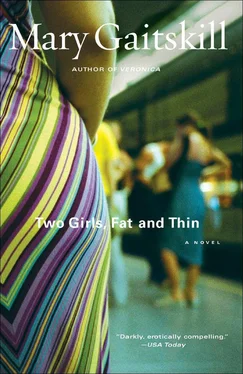Mary Gaitskill - Two Girls, Fat and Thin
Здесь есть возможность читать онлайн «Mary Gaitskill - Two Girls, Fat and Thin» весь текст электронной книги совершенно бесплатно (целиком полную версию без сокращений). В некоторых случаях можно слушать аудио, скачать через торрент в формате fb2 и присутствует краткое содержание. Год выпуска: 2012, Издательство: Simon & Schuster, Жанр: Современная проза, на английском языке. Описание произведения, (предисловие) а так же отзывы посетителей доступны на портале библиотеки ЛибКат.
- Название:Two Girls, Fat and Thin
- Автор:
- Издательство:Simon & Schuster
- Жанр:
- Год:2012
- ISBN:нет данных
- Рейтинг книги:5 / 5. Голосов: 1
-
Избранное:Добавить в избранное
- Отзывы:
-
Ваша оценка:
- 100
- 1
- 2
- 3
- 4
- 5
Two Girls, Fat and Thin: краткое содержание, описание и аннотация
Предлагаем к чтению аннотацию, описание, краткое содержание или предисловие (зависит от того, что написал сам автор книги «Two Girls, Fat and Thin»). Если вы не нашли необходимую информацию о книге — напишите в комментариях, мы постараемся отыскать её.
Review) create a haunting and unforgettable journey into the dark side of contemporary life and the deepest recesses of the soul.
Two Girls, Fat and Thin — читать онлайн бесплатно полную книгу (весь текст) целиком
Ниже представлен текст книги, разбитый по страницам. Система сохранения места последней прочитанной страницы, позволяет с удобством читать онлайн бесплатно книгу «Two Girls, Fat and Thin», без необходимости каждый раз заново искать на чём Вы остановились. Поставьте закладку, и сможете в любой момент перейти на страницу, на которой закончили чтение.
Интервал:
Закладка:
He paced as he talked, now and then walking close to the windows to peer out, rubbing his fingers together as though grinding something to powder, nibbling zestfully at the snacks that occasionally dropped down his shirt front, and drinking beer. My mother moved about the kitchen in a frilly apron, her hair bound into a ponytail with a rubber band garnished with large plastic flowers. She listened enthralled to the stories of betrayal and redemption, nodding vigorously, shaking her head in disapproval or agreeing, “Absolutely! That’s right!” as the music underscored her husband’s stirring rendition of his eventual triumph. “You can’t throw your weight around like that in my office, buddy. It’s okay to be a tough guy, but you’d better be sure I’m not tougher. And nine times out of ten I am.” I would listen gravely as they talked. It seemed as though they were arranging the world, making everything safe and understood. By the time we sat down to dinner, life was friendly and orderly, and we could regally feast on chili over spaghetti noodles, with chocolate ice cream in little ceramic cups for dessert. Then there would be TV — soldiers winning, dogs rescuing children, criminals going to jail, women finding love — and then my mother would carry me to bed singing, “Up the magic mountain, one, two, three. Up the magic mountain, yessiree.”
When I was five years old , my mother had a friend named Edwina Barney who came almost every afternoon to teach her how to drive and later, how to swim. She was tall, slender, and gracefully slow-moving; she had a large benign face with slightly pouchy cheeks, a relaxed mouth, and heavy-lidded eyes that, in glasses, had a slightly crocodilian look. She wore loose clothes with big, bright patterns on them and sandals with red cherries on the toes. She towered over my nervous-moving little mother. When I went with them to the “Y” for the swimming lessons and sat in the tiled “pool area,” rolling ungnawable jawbreakers from cheek to cheek, I admired her gliding through the pool like an imperious seal, my mother dog-paddling behind, her sincere obedient head lifted tensely out of the water. After class, Edwina drove us home with one long arm hanging halfway out the open window, talking about small subjects with a manner that made them big, all her words planted firmly in the low, relaxed sound of her voice. When we got home, she and my mother would sit in the kitchen drinking coffee, their swimsuits hanging on chairs placed before the stove, Edwina stretching her legs out over an extra chair, talking in her strong, melodious voice that my mother’s voice responded to or complemented rather than met. It was clear to me where the authority lay between them. Our family was self-contained and hoarding, with a clear sense of separation from other people, and Edwina was like an emissary from another kingdom, an ally who traveled through the chaos of cars and strangers and traffic systems to share this authority with us, this quality that enabled her to say whatever she wanted to say and have it be so. That, along with her physical grace (and in my eyes, beauty), made me love her. I rushed to meet her when she came to the door, I introduced her to my stuffed animals and showed her my drawings which she would study and say, of my portrayal of a lion, “That’s a real lion all right. It may not look exactly like a real lion, but that doesn’t matter because it’s got lionness,” and it would be so.
I loved her even when, one day after class when we were all in the kitchen, there was a sudden change in the tone of conversation, and Edwina jerked her head in irritation and said the word “stupid.” I was busy working on a drawing and I didn’t hear the entire sentence, but I knew from the way my mother suddenly turned her head and reflexively picked an already chewed nail that she had been called stupid. There was only a moment of silence, and then they went on talking, my mother moving with stiff animation when she got up to get a plate of cookies for them to eat. Edwina sat with her head and face presented regally to the room, her oddly self-righteous expression that of a person who has successfully imposed her personality on someone else.
Like Edwina, my father could say it and it would be so. Sometimes he would come home when Edwina was still visiting and he would say, “Hey, it’s old Ed Barney!” and invite her to stay “for a few brews.” When that happened, we would all move into the living room, and my father would put on a record, and they would talk, each telling truths and agreeing with one another, organizing the world with their words and deciding what was right or wrong as the music ranted. “That’s right,” one would say to the other, as they all vigorously nodded their heads. “You’re absolutely right.”
Once though, Edwina did not agree with my father. He sat in his chair with his neck craning angrily forward, rubbing his fingertips together as though crushing something into powder. He used words I didn’t understand in a tone of voice that filled the room and pressed down on my neck, making me want to compress my bones and breath. My mother said, “Oh Al.” He ignored her, crushing her voice with his yells. Edwina sat stiff and bristling in her chair, her long hands deliberately loose on her wrists. She talked, and he interrupted her. He stamped over her words, but her face and body held the weight of his voice off her, and she occupied the little space around her with the same imperious face she’d made when she called my mother stupid. My father strained forward as though he would spring.
“I’m not going to stay and listen to this,” she said, and she stood, knocking over her glass of beer. As she walked to the closet to get her coat, my father did spring, and I was shocked to see Edwina break into a run, which she controlled almost immediately. My father followed her out the door yelling at her, his fists balled. I understood that he was telling her she was bad, evil, she had aligned herself with the terrible things in the world. I don’t remember if I felt anger or sadness or fear. I can only picture myself frozen and compressed, staring at my crayon drawing. I can’t remember what my mother did.
It was a long time before Edwina came to see us again. When she did, she and my father were friends again, but their faces held little reservations that prevented total agreement. He would look at her as though she were a naughty but lovable child, and she would look at him as though he were not as smart as she was but that she liked him anyway. There was no change between Edwina and my mother.
This and every other image from that time is faded, small and surrounded by a thick border of fuzzy, quavering blackness. The images aren’t connected; there are large spaces between them filled with the incoherent blackness. The emotions belonging to the images are even more unclear; they seem a slur of abnormal happiness, as if my childhood were characterized by the cartoons I watched on TV. This is probably because the adults around me, believing childhood to be a pretty thing, encouraged me to feel that way, talking to me in baby talk, singing about itsy-bitsy spiders and farmers in the dell, laying an oil slick of jollity over the feelings that have stayed lodged in my memory, becoming more and more grotesque as time goes on. But the feelings continue to lurk, dim but persistent, like a crippled servant, faithfully, almost imbecilicly trying to tell me something in the language of my childhood, my own most intimate language which has become an indecipherable code.
I remember the time a kid fell off our porch and cracked his skull. It was Halloween, and I wasn’t allowed to go out because my mother thought that, at five, I was too young. My mother dressed for the occasion in her red terry-cloth robe that reached the floor and made her look thick and imposing. The ordinary packaged candy looked special in a large crystal punch bowl. She handed it out with a gently officious air, enjoying herself as my father sat quietly in the shadows of the dim, radio-mumbling house. Most of the kids in our neighborhood were close to my age, and they stood bashful and ungainly in their monstrous wings and clown feet, incredulous and feeling slightly guilty that a stranger had put on a ceremonial dress to give them handfuls of candy. Sometimes a crowd of big kids would come and bellow “trick or treat” like a threat, or even thrust their masked faces into our living room to scream right at my mother, who screamed in return and hurriedly thrust the candy at them. It was during one of these screaming moments that we heard the real screams of a small child who had just fallen off the porch. There was a scramble of movement amid masked children in the dark, and then the boy was in our bright kitchen, sitting on a stool, bundled in a blanket, sucking his thumb. Probably his parents were there somewhere, but I don’t remember them. My mother was on the phone to the hospital, picking her nails while my father paced in and out of the room, coughing and wiping his mouth. He said something that made me think we could get into trouble because the boy fell off our porch.
Читать дальшеИнтервал:
Закладка:
Похожие книги на «Two Girls, Fat and Thin»
Представляем Вашему вниманию похожие книги на «Two Girls, Fat and Thin» списком для выбора. Мы отобрали схожую по названию и смыслу литературу в надежде предоставить читателям больше вариантов отыскать новые, интересные, ещё непрочитанные произведения.
Обсуждение, отзывы о книге «Two Girls, Fat and Thin» и просто собственные мнения читателей. Оставьте ваши комментарии, напишите, что Вы думаете о произведении, его смысле или главных героях. Укажите что конкретно понравилось, а что нет, и почему Вы так считаете.












